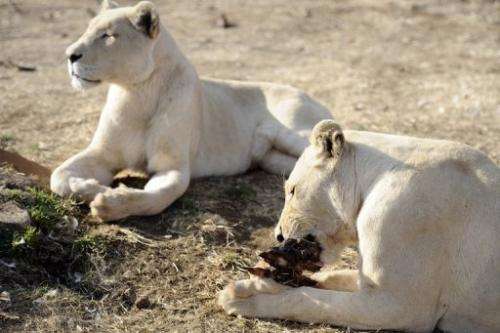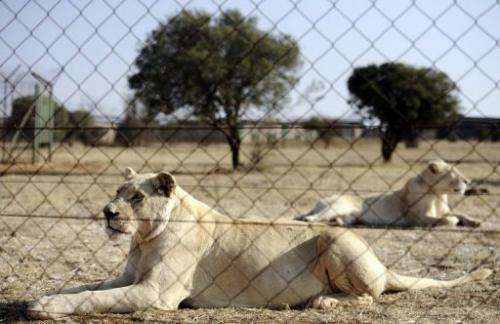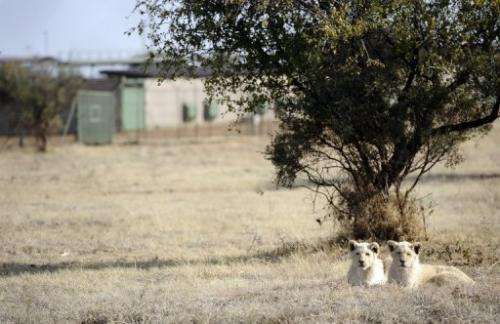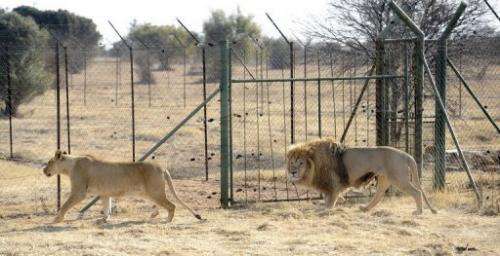Fears for South Africa's lions

Lions may be the well-reputed kings of the savannah, but South Africa's lucrative trophy-hunting industry means the regal cats are more likely to know the inside of a paddock ringed with an electric fence than the country's sweeping plains.
To the dismay of animal rights activists and environmentalists, growing numbers of the predators are being farmed for hunting, with more than half of South Africa's roughly 8,000 lions now in captivity.
"The principle that you breed wild animals for economic exploitation is an international norm. It takes place everywhere in the world," said Pieter Potgieter, chair of the South African Predator Breeders' Association.
But "the problem is with the lions because the image has been created in the minds of people that the lion is the king of the animals. Walt Disney with his Lion King and all these things, they have created that image," he added.
The big cats are bred in pens then leased to zoos or game farms, where they are kept in cages or used as pets to attract tourists.
When they mature, some of them are released into the wild. The release usually happens just days before trophy hunters shoot them.

Breeders treat lions just like any other farm animals before leaving them to the mercy of trophy hunters.
"In principle, a lion is no more or less than any other animal species," Potgieter said.
An estimated 3,000 or so lions live wild in South Africa, compared to more than 5,000 held in paddocks.
In the rolling savannah plains in the country's centre is Bona Bona Game Lodge, situated near the corn-farming town of Wolmaransstad.
A few hundred metres from the lodge, which is also a popular wedding venue, are large cages with nine placid lions and three Bengal tigers. It housed three times that number of lions before an annual auction in June.
The lions are fed weekly, each Sunday morning—an exercise visitors pay an entrance fee of 80 rand (6.8 euros, $9) to watch. Animal lovers pay 300 rand to play with cubs or give them a feeding bottle at most zoos.

"Cubs are rented out by the captive lion breeders to eco-tourism resorts to be petted by tourists, who are assured that such cubs will be set free," said Chris Mercer of the animal rights group Campaign Against Canned Hunting.
But a fuming Mercer says: "Tourists should know that these cubs will not be returned to the wild. They will, instead, be returned to the breeders... as semi-tame targets for the lucrative canned hunting industry."
"These cubs are farm-bred, held in confined spaces until they are old enough to be hunted," he adds.
Paul Hart, who runs Drakenstein Lion Park in the southern Cape region, said it was the "process of removing cubs from their mothers at birth specifically so that they can be used as play things and to increase the speed of breeding that is inherently cruel, not to mention the methods employed to ensure the cubs are docile with tourists."
Critics say some lions are also specially bred for their bones, which are sent to Asia to end up in potions, but farmers deny that claim.

Amateur trophy hunters—most of whom come from the US—each year kill about 500 captive-bred lions in South Africa.
Hunters are ready to part with $22,000 per male lion, in addition to just about as much for other logistical and taxidermy costs. A lioness however comes in much cheaper at $4,000.
The trophy-hunting practices also raise controversy.
In the Northwest province with the most lion-breeding farms, the cats are often released, hungry, just four days before a hunt.
Unleashing them into unfamiliar turf means they are unlikely to escape their pursuers.
But farmers justify the practice.
"Whether you kill a cow, a sheep or a pig, or you kill a lion, it's exactly the same thing. It's an animal," Potgieter argues.
A recent study by the Duke University in North Carolina has shown that two thirds of the African lion population have vanished over the past 50 years, to around 35,000 from nearly 100,000.
The US Fish and Wildlife Service also recently announced it would launch a review on whether to list African lions as endangered species.
Such a listing would prevent US hunters from bringing lion trophies from Africa back to the United States.
(c) 2013 AFP


















